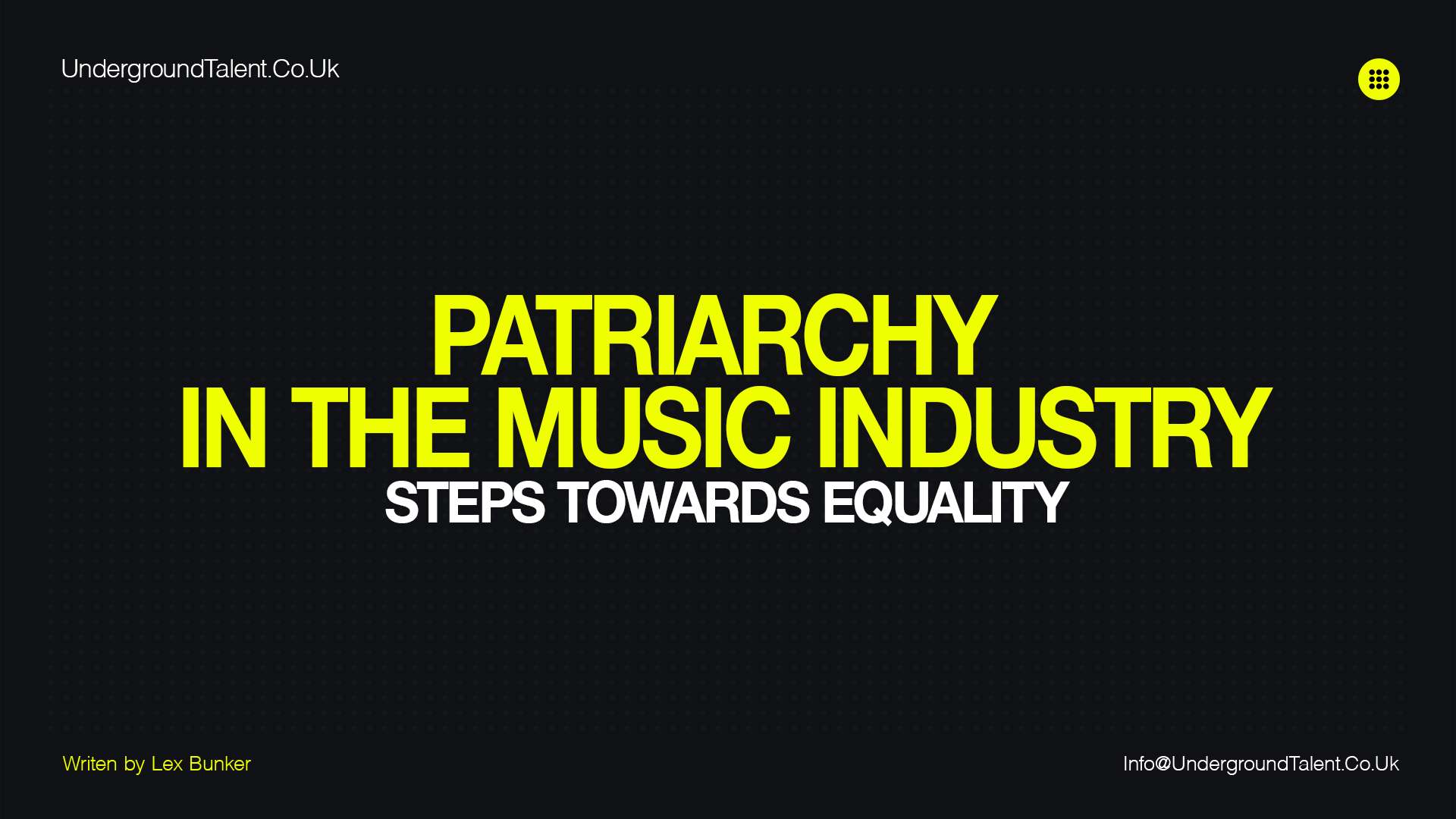Patriarchy in the Music Industry: Introduction
Electronic music has been a driving force of creativity and innovation for decades, with its sound constantly evolving and pushing boundaries. However, the industry has also been marked by a patriarchal structure that limits its true potential.
The impact of gender inequality has resulted in limited opportunities and representation disparities for female and non-binary artists, perpetuating systemic problems. In this article, we’ll explore the significance of addressing gender inequality and the need for fostering inclusivity in the electronic music scene.
Don’t Miss: Techno Events: How to Plan & Organize the Perfect Techno Party
The Impacts of Patriarchy on the Music Industry
Representation Disparities
The underrepresentation of female and non-binary artists in festival lineups, award nominations, and media coverage is a significant issue within the electronic music industry. This lack of representation has a direct impact on career growth and visibility for these artists. The problem is particularly acute in mainstream festivals, where headliners are predominantly male. This lack of representation hinders the growth of the industry, as it fails to showcase the full range of talent available.
Limited Opportunities for Female and Non-Binary Artists
Representation disparities directly affect opportunities for female and non-binary artists. Limited opportunities for advancement in the industry make it difficult for these artists to break through and achieve success, thus limiting their access to resources and earning potential. This can lead to a talent drain, as artists abandon the industry in frustration. This highlights the need to create a level playing field, where female and non-binary artists can thrive and reach their full potential.
Stereotypes, Sexism, and Their Effects
Gender stereotypes and sexism are pervasive in the electronic music industry. Female and non-binary artists are often undervalued, their accomplishments overlooked, and their work undermined. Stereotypes such as “women can’t produce” or “female DJs are just eye candy” are harmful and perpetuate inequality. Such stereotypes result in the undervaluation of female and non-binary artists, leading to their exclusion from key opportunities and ultimately limiting their potential.
Tokenism in Festivals and Events
Tokenism is a common issue in the electronic music industry, where female and non-binary artists are added to festival lineups or events to create the illusion of diversity without addressing systemic problems. This superficial approach reinforces harmful stereotypes and fails to promote genuine change. Tokenism, therefore, should be avoided, and instead, there should be a genuine effort to provide equal opportunities and support for all artists.
The Male-Centric Industry Culture
The male-centric culture within the electronic music industry is a significant barrier to gender equality. This culture can create an unwelcoming environment for women and non-binary individuals, which can deter them from pursuing careers in the industry, ultimately hindering their success. To address this, a change in culture is needed, with a focus on inclusivity, diversity, and equal representation.
Don’t Miss: Mark Jenkins: Interview With the Legend of Electronic Music
Patriarchy in the Music Industry: Addressing the Issues, Notable Initiatives and Progress
Increased Representation in Festival Lineups
There has been a recent push to improve representation in festival lineups, which is a positive step towards addressing gender inequality. Promoters, organizers, and artists are actively working towards providing a platform for female and non-binary artists, with the goal of creating a more diverse and inclusive industry.
Support Networks and Collectives for Underrepresented Artists
Support networks and collectives are increasingly being established to provide mentorship, guidance, and resources for underrepresented artists. These networks create a space for collaboration, knowledge-sharing, and growth, ultimately helping to break down barriers and promote inclusivity.
Advocacy for Gender Equity Within the Industry
Organizations and individuals are advocating for gender equity, pushing for inclusive policies and practices that create a more level playing field for all artists. These efforts include calls for equal representation, diversity and inclusion policies, and more opportunities for female and non-binary artists.
Mentorship Programs and Resources for Emerging Artists
Mentorship programs and resources are being developed to guide and support emerging female and non-binary artists. These programs offer valuable insights and advice, helping artists navigate the industry successfully. They also provide a platform for networking and building relationships, which can be crucial for success in the industry.
Educational Programs to Raise Awareness and Challenge Biases
Educational programs are essential in challenging biases and stereotypes within the industry. These programs aim to raise awareness about gender biases, promote inclusivity, and create a more supportive and welcoming environment for all artists. They also provide a space for dialogue and discussion, fostering understanding and empathy.
Don’t Miss: Fossil Archive aka Roberto / R.M.K. @ Special Guest Interview
Patriarchy in the Music Industry: Recommendations for Further Progress
Adopting Inclusive Hiring and Booking Practices
Organizations within the electronic music industry should prioritize inclusive hiring and booking practices to ensure that female and non-binary artists have equal opportunities to succeed. This includes actively seeking out and promoting diverse talent and considering diverse perspectives in decision-making processes.
Implementing Diversity and Inclusion Policies Within Organizations
Organizations should implement diversity and inclusion policies that promote a supportive environment for all artists. This includes creating safe spaces, encouraging collaboration, and actively working towards eliminating bias and discrimination.
Encouraging Allyship and Collaboration Among Artists
Promoting allyship and collaboration among artists can help break down barriers and create a more inclusive industry culture. Artists can work together to amplify underrepresented voices, foster understanding, and promote change within the industry.
Challenging Stereotypes Through Representation and Storytelling
To dismantle harmful stereotypes, it’s crucial to amplify diverse voices and stories in the media, showcasing the full spectrum of talent in the electronic music scene. This can be achieved through increased representation and promotion of female and non-binary artists, as well as through the development of diverse storytelling platforms.
Amplifying Female and Non-Binary Voices in the Media
By giving female and non-binary artists more visibility in the media, we can work towards a more equitable and diverse industry that celebrates all artists. This includes increasing coverage and promotion of their work, as well as developing media platforms that cater specifically to underrepresented voices.
Read Also: Top 20 Female Techno DJs Dominating the Electronic Music Scene
Patriarchy in the Music Industry: Conclusion
Acknowledging the progress made so far
As we reflect on the journey to dismantle patriarchy in the electronic music industry, it’s essential to acknowledge the progress that has been made. From increased representation in festival lineups to the establishment of support networks and collectives, these milestones demonstrate the industry’s commitment to fostering inclusivity and equality. By celebrating these achievements, we can maintain momentum and inspire further change.
Read Also: Stop Being a Perfectionist by Lex Bunker
Recognizing the ongoing work needed to dismantle patriarchal structures
Despite the progress made, we must recognize that there is still much work to be done to fully dismantle patriarchal structures within the industry. It’s crucial to address the deep-rooted biases and barriers that continue to impede the success of female and non-binary artists. By remaining vigilant and committed to fostering change, we can ensure that the electronic music scene continues to evolve in a more inclusive direction.
Read Also: The Rave Diet: What to Eat After Rave to Recover?
Emphasizing the importance of creating an inclusive and equitable electronic music industry for all artists
In conclusion, the fight for inclusivity and equity in the electronic music industry is of utmost importance. By actively working to dismantle patriarchal structures, we can create an environment where all artists, regardless of their gender, are given the opportunity to thrive. The rich tapestry of diverse voices in the electronic music scene is what makes it so vibrant and engaging. By embracing and celebrating this diversity, we can ensure that the industry reaches its fullest potential and continues to captivate audiences around the world.
Read Also: DJ’s Guide to Local Gigging by Emma Yasumi
Connect with Underground Talent
You can find us on Facebook, Soundcloud, and Instagram. We encourage you to share your thoughts and feedback on this article, and we look forward to continuing to educate and inform you on this important topic.
You can find us on, and, and don’t hesitate to reach out to us if you have any questions or comments by email at info@undergroundtalent.co.uk.
Don’t miss out on the latest and greatest underground talent! Subscribe to our YouTube channel now and stay on top of the freshest and most exciting new acts in the techno scene. Click the subscribe button and join our community of techno music lovers today!
And Always Remember…
Have Fun & Be Creative!





